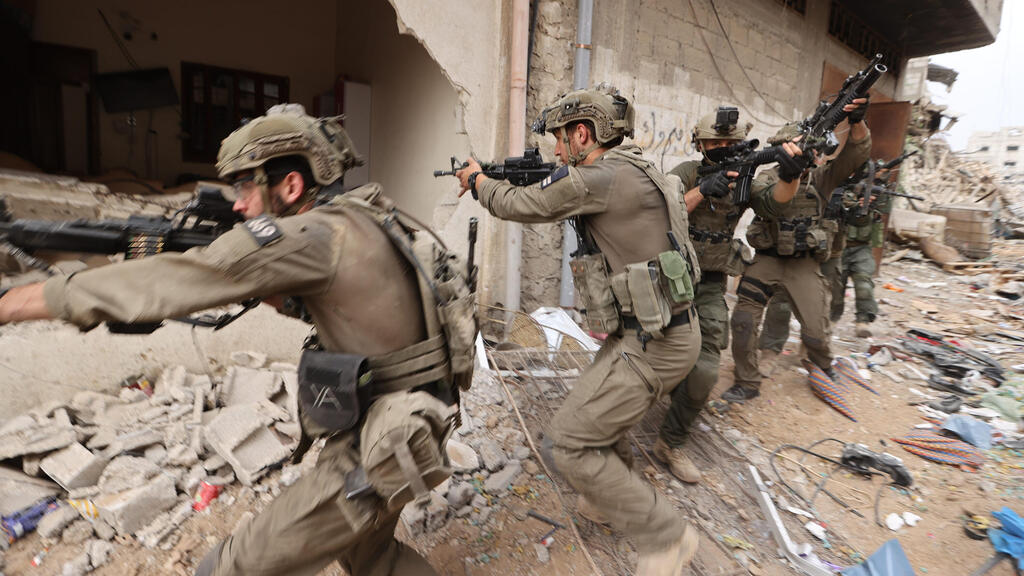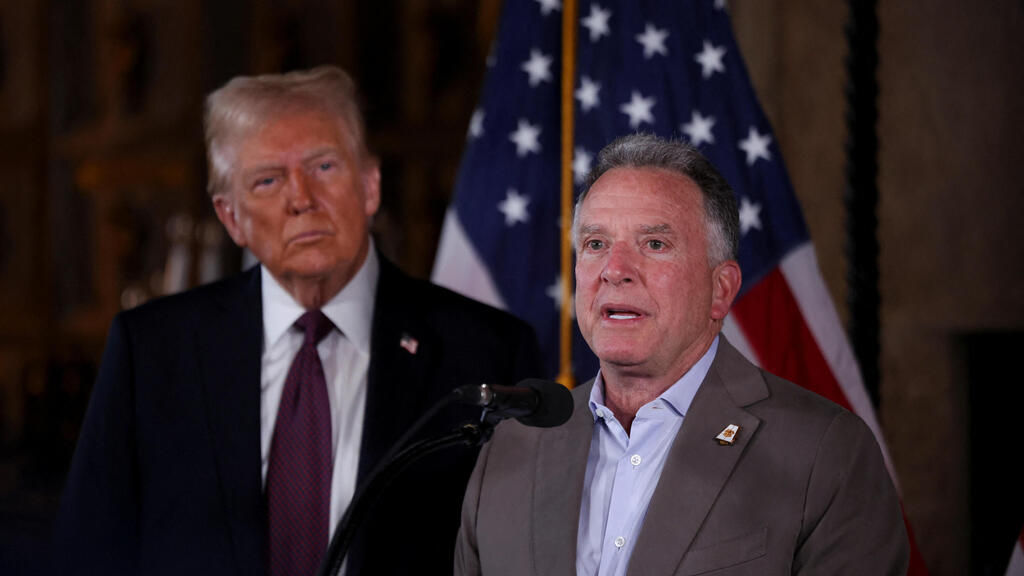Getting your Trinity Audio player ready...
The IDF fighters killed near Beit Hanoun on Saturday sacrificed their lives in the effort to secure the hostages' release. The ongoing battles in the Gaza Strip are designed, first and foremost, to pressure Hamas into making concessions in cease-fire and hostage negotiations, aiming to ensure more hostages return alive when the war ends.
As the IDF launched its latest offensive in northern Gaza, its government-defined missions included preventing Hamas from transitioning into a guerrilla force operating less than two kilometers (1.2 miles) from Israel's border. The offensive also aims to apply sustained military pressure on Hamas through repeated attacks and the destruction of underground infrastructure, with the ultimate goal of facilitating hostage releases.
4 View gallery


IDF soldiers look on at the destruction in Beit Hanoun
(Photo: Kai Pfaffenbach / Reuters)
Contrary to public perception, Prime Minister Benjamin Netanyahu and his close advisors view military pressure as the only leverage strong enough to compel slain leader Yahya Sinwar's successors, including his brother Mohammed Sinwar, to agree to a cease-fire. Hamas fears that Israel’s persistent IDF operations in the north are designed to sever the area from the rest of Gaza and prevent residents from returning, a concern that increases their incentive to negotiate.
Although the destruction of remaining buildings may not be Israel’s intent, Hamas perceives it as an existential threat, fueling their motivation for a deal. Israel plans to maintain this pressure until an agreement is reached, ending the war and ensuring the safe return of all hostages.
Hamas seeks to declare victory by securing the release of hundreds of Palestinian prisoners from Israeli jails, including convicted murderers. This is crucial for the Islamist group as it aims to raise funds to rebuild its military capabilities post-war, with hopes not only of survival but of regaining strength.
IDF troops operate in Beit Hanoun
(Video: IDF)
Netanyahu, his ministers and security chiefs recognize that an end to the war is inevitable. They are aware that under the current circumstances, such an outcome would leave Hamas in power in Gaza. Should a hostage release deal be reached, Israel would quickly pivot to discussions on Gaza’s post-war governance.
In fact, these discussions have already begun in Qatar, with a framework agreed upon by mediating nations, including the United States and the UAE. According to the outline, civilian governance in Gaza—along with law enforcement responsibilities—would be handed over to a temporary Palestinian administration comprising Gazan professional technocrats unaffiliated with any political faction.
Some members of the proposed temporary government are former Palestinian Authority (PA) officials, while others served in civilian roles under Hamas without being registered members of its political wing.
The interim government would function under the oversight of an international committee, which is expected to include representatives from the United States, the UAE and possibly Jordan, Egypt and Saudi Arabia. This committee would also provide the billions of dollars required to rebuild Gaza.
Egypt is spearheading efforts to form the interim government, while Washington and the UAE are taking the lead in establishing the international oversight committee.
The Egyptians have referred to the temporary government as "The Committee to Support Gaza." Hamas has said it will not demand a role in governing the enclave and has agreed to the establishment of a ruling body deriving its authority from the PA and Chairman Mahmoud Abbas. However, Abbas himself is not expected to play a practical role, as the interim government will be headed by a Gaza resident.
Israel has unofficially expressed opposition to Qatar's involvement in the international oversight committee. Netanyahu has repeatedly stated his opposition to any role for the PA in governing Gaza. While the UAE, Saudi Arabia, Egypt and Jordan do not insist on Qatar's participation, they demand a leading role for the PA and advocate for steps toward establishing an independent Palestinian state.
Get the Ynetnews app on your smartphone: Google Play: https://bit.ly/4eJ37pE | Apple App Store: https://bit.ly/3ZL7iNv
Discussions about post-war Gaza are influencing cease-fire and hostage release negotiations, compounded by statements from U.S. President-elect Donald Trump, who has made clear he expects a deal to be finalized before he takes office.
Trump has warned "there will be all hell to pay" if an agreement is not reached. While some have dismissed his comments, the incoming president could cut back on humanitarian aid to Gaza, much of which is allegedly misappropriated by Hamas to consolidate its control over civilians.
A reduction in aid could spark civilian unrest, undermining Hamas' control. Additionally, Trump could block funding for Gaza's reconstruction, using it as leverage against the group's leadership.
Trump may also push for significant changes in Israel's approach, potentially pressuring Netanyahu to take steps he has long resisted due to his political and ideological stances. Among these is likely a demand for Netanyahu to agree to PA involvement in post-war Gaza, including control of the Rafah border crossing. Reports suggest that Trump’s envoy, Steve Witkoff, raised this issue during his meeting with Netanyahu on Saturday.
 Ron Ben-YishaiPhoto: Courtesy
Ron Ben-YishaiPhoto: CourtesyThe hostage release deal, post-war governance of Gaza and ongoing military pressure in the enclave are deeply interconnected. Progress on one hinges on an agreement in principle on all, which is critical for the IDF to conclude its mission and withdraw from Gaza.
Should negotiations fail, the military and security services, under instructions from Defense Minister Israel Katz, are reportedly preparing for a large-scale operation to take full control of Gaza. While such an offensive has been avoided thus far due to the risk it poses to hostages, it could become the next step if a deal for their release remains elusive.









